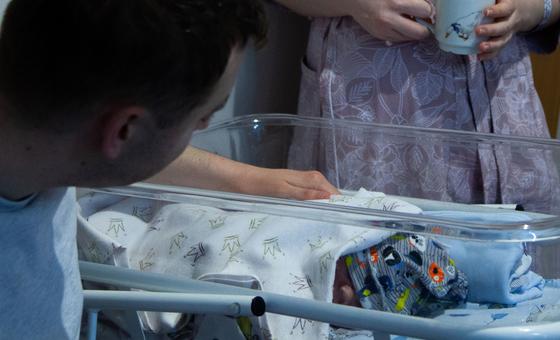
Birth in a war zone: Coping amid ongoing attacks in Ukraine
Like many expecting parents, Oleksandra and Oleksandr Chebotar were eagerly awaiting the birth of their daughter. The way it happened, however, was unlike anything they had ever imagined.
The couple had gone to Maternity Hospital No. 5 in the port city of Odesa in southern Ukraine. The facility is known for its comprehensive maternity care and had earned some local fame as the birthplace of quintuplets.
But, just after Ms. Chebotar delivered her baby, an air raid alarm sounded over the city, which remains a regular target of Russian missile and drone attacks. Using a mobile incubator, the medical team quickly moved the newborn baby and her panicked parents to the hospital’s underground bomb shelter along with other patients.
The transportable incubators come with artificial lung ventilation and were provided by UNFPA, the UN sexual and reproductive health agency, to help bridge the gaps in supplies and services facing hospitals across Ukraine triggered by the ongoing conflict.
Increase in birth complications
Maternity Hospital No. 5 has faced unprecedented difficulties amid the ongoing war and made rapid, unforeseen changes to support pregnant women and new mothers as they navigate the challenges of giving birth in a war zone.
The war has led to a 12 per cent increase in birth complications at this maternity hospital alone, a statistic that highlights the severe impact of stress and disruptions on pregnant women, within the context of increased ongoing shelling.
“Pregnant women are not only coming here from Odesa, but from across the South, close to the frontline,” said Dr. Igor Shpak, a leading obstetrician at the hospital. “The stress and disruptions from the conflict have led to higher rates of Caesarean sections and premature deliveries.”
New underground bunkers
Another person taking shelter in the hospital’s bunker was Radionova Alevtyna Viktorivna. The expectant mother was waiting for a medical check-up when the air raid sirens sounded.
The construction of new underground bunkers has become a critical initiative to support and protect expectant mothers. Ms. Radionova said there is a growing need for secure, well-equipped spaces where women can safely continue their pregnancies despite the ongoing threats.
Maternity Hospital No. 5 recently built and reinforced its air raid shelter. These bunkers are designed to provide security while also being equipped with the necessary medical facilities to ensure that healthcare services can continue uninterrupted during attacks.
Deepening healthcare crisis
The situation in Odesa’s maternity hospitals reflects a broader crisis affecting Ukraine’s healthcare system. There is an urgent need for continued support and global attention to improve conditions for maternity care in conflict zones.
In the first six months of the year, the World Health Organization (WHO) verified 160 attacks on healthcare facilities across Ukraine. This destruction has left a significant gap in maternal and newborn care, with 23 per cent of facilities unable to provide these essential services.
The energy infrastructure in Odesa and across Ukraine continues to come under repeated attacks, leading to significant disruptions and increased costs for basic services.
With power lines and generation capacities damaged, the price of electricity and heating has steeply increased, placing an additional financial burden on families already struggling amid the conflict.
These attacks not only affect daily living conditions but also impede hospitals’ abilities to provide consistent care as power outages disrupt critical medical equipment and services.







